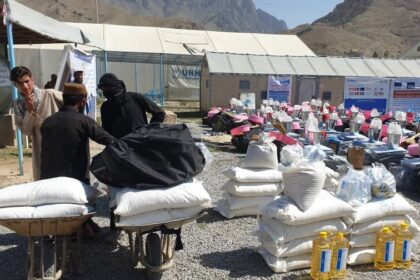RASC News Agency: During a meeting in Doha, Heili Kanrova, the Ambassador of the Finnish Embassy in Afghanistan, delivered the assertive message to Matiul Haq Khalis, the leader of the Taliban faction for the Afghanistan Red Crescent, that Finland remains committed to tirelessly providing crucial humanitarian aid to the Afghanistan Red Crescent Society.
Moreover, the press office of the Afghanistan Red Crescent Society promptly shared the intricate details of the meeting and the substantive discussions that transpired. The esteemed delegation, headed by Mawlawi Matiul Haq Khalis, included the eminent presence of Heili Kanrova, the Ambassador of the Finnish Embassy in Afghanistan, and the representative from Red Crescent Finland. This captivating assembly took place in Doha, the vibrant capital of Qatar, with a dedicated focus on the aftermath of the Herat earthquake and the continued humanitarian endeavors in Afghanistan.
Furthermore, within the confines of the said meeting, the Finnish Ambassador significantly underscored Finland’s unwavering dedication to extending profound humanitarian assistance in the healthcare sector of Afghanistan. The Ambassador stressed the utmost paramountcy of providing essential aid and support to ensure the well-being of the Afghanistani people. In return, Mawlawi Matiul Haq Khalis profoundly expounded upon the resolute commitment, substantial competencies, and exemplary transparency demonstrated by the Afghanistan Red Crescent Society in the wake of the Herat earthquake and other natural catastrophes that have befallen the nation.
In the wake of the devastating earthquakes that struck the Herat province, causing loss of life and significant financial hardship among its residents, there has been an urgent surge in the demand for comprehensive humanitarian relief within the country. Numerous aid organizations have also pledged their steadfast solidarity and unwavering assistance to aid the victims in this time of dire need.
Furthermore, the recent earthquakes have wreaked havoc, inflicting widespread damage and resulting in thousands of casualties, injuries, and displacements. Moreover, the catastrophic quakes have left in their wake a trail of destruction, ravaging crucial infrastructure throughout the Herat province. The magnitude of this aftermath necessitates swift and resolute action to alleviate the suffering of the affected communities and restore normalcy as much as possible.






